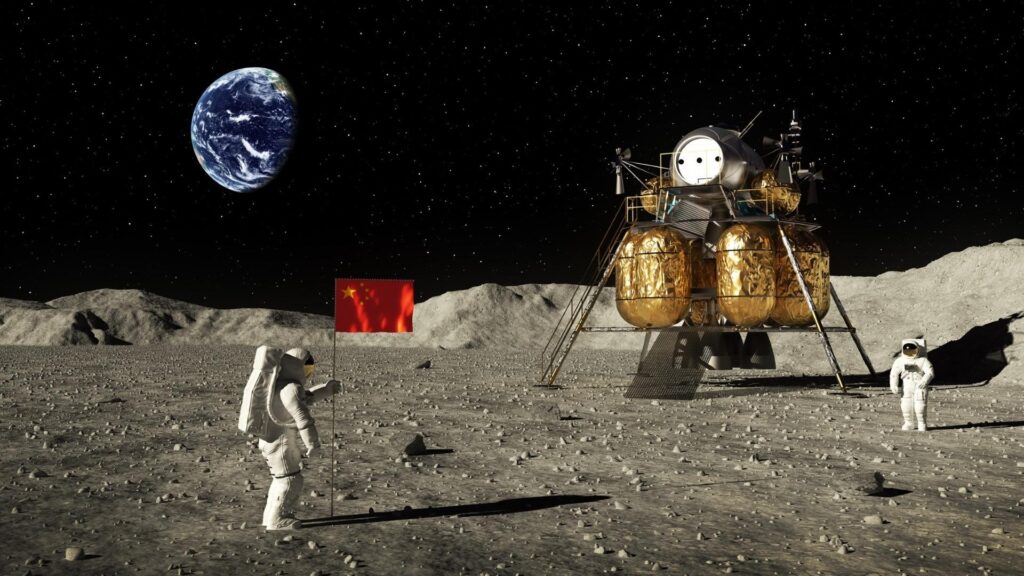In the vast expanse of space, a new chapter in the age-old race for lunar dominance is unfolding as the United States and China strive to establish their presence on the Moon. However, amidst this cosmic competition lies a precarious legal landscape riddled with loopholes that could potentially spark conflict between these two superpowers. As space exploration reaches new heights, the implications of unresolved legal uncertainties in space law become increasingly apparent, raising pressing questions about the potential risks and consequences of this new space race.
The Legal Landscape of Space Exploration: US vs China
While the US and China both aim to reach the Moon in the near future, the legal framework surrounding space exploration remains hazy. As these two superpowers race to achieve their lunar goals, potential loopholes in space law could lead to conflicts and disputes. With no clear guidelines on how to regulate activities on the Moon, such as mining or establishing permanent bases, tensions between the US and China could escalate if their interests clash.
In the absence of comprehensive international agreements, the lack of a unified code of conduct for space exploration could leave room for interpretation and exploitation. The competing interests of the US and China in space exploration highlight the need for clearer regulations to avoid potential conflicts. As both countries continue to advance in their missions to the Moon, it becomes crucial for policymakers to address these legal gaps and work towards a more solid legal framework that can prevent escalations and ensure peaceful cooperation in space exploration.
Loopholes in International Space Law and Potential Conflicts
The current space race between the US and China has brought to light loopholes in international space law that could potentially lead to conflicts in the near future. With both countries making significant advancements in their space exploration programs, the lack of clear regulations and enforcement mechanisms in space law poses a threat to maintaining peace and stability in outer space.
Some of the key loopholes in international space law include:
- Elusive definitions: The ambiguity surrounding terms such as “space resources” and “celestial bodies” creates confusion about ownership rights and exploitation of resources in space.
- Unclear jurisdiction: The lack of clarity on which laws govern activities in space and how conflicts will be resolved leaves room for misunderstandings and disputes between nations.
Navigating Space Diplomacy: Recommendations for Preventing Conflict
With the US and China both ramping up their space exploration efforts, the race to the Moon is heating up. However, the lack of clear regulations in space law could potentially lead to conflicts between these two superpowers. It is crucial for both countries to navigate space diplomacy carefully to prevent any misunderstandings or escalations.
Here are some key recommendations to avoid conflict:
- Establish Clear Communication Channels: Ensuring open lines of communication between the US and China will be essential in preventing misinterpretations of intentions.
- Collaborate on Space Exploration: By working together on missions and sharing resources, both countries can foster cooperation and trust in space activities.
Ensuring Peaceful Coexistence: Strengthening Space Governance and Collaboration
With the US and China engaging in a race to the Moon, the potential for conflict in outer space is becoming a real concern. Loopholes in existing space law could allow for disputes to escalate, putting peaceful coexistence at risk. Strengthening space governance and collaboration is essential to prevent such conflicts from arising.
By enhancing international cooperation and creating clear regulations, we can ensure that space exploration remains a peaceful and cooperative endeavor. Establishing guidelines for responsible behavior in space, promoting transparency, and fostering communication between nations are crucial steps towards maintaining a peaceful coexistence in the vastness of outer space.
The Way Forward
As the competition between the United States and China intensifies in their race to the Moon, the legal framework surrounding space exploration and exploitation may prove to be a challenging terrain to navigate. The loopholes in international space law leave room for potential conflicts and disputes to arise in this new era of space exploration. It is imperative for both nations to engage in open dialogue and cooperation to ensure a peaceful and collaborative exploration of the final frontier. Only through a shared commitment to upholding the principles of space law can we truly unlock the potential of our cosmic endeavors.


